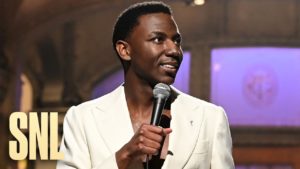Jerrod Carmichael’s Rothaniel: “Here’s Everything”
There have been few weekends where I go to turn on Saturday Night Live and am unfamiliar with the host; the April 2nd episode was one of those times. Following John Mulaney, Oscar Isaac, and Zoe Kravitz as the three preceding hosts comes Jerrod Carmichael, a 35-year-old comedian with three HBO specials and a no-longer-running NBC sitcom. He was hosting, as many hosts do, in tandem with the release of his newest special, Rothaniel, which came out the day before his SNL episode. It seemed that this was just one of those weeks with a less popular host, a fact echoed in comments from viewers on social media. 
Jerrod Carmichael knew no one knew him, as expressed in his opening monologue. He refers to himself as “the least famous host in SNL history,” earning many laughs and cheers from the audience. Carmichael has no social media presence, and his last special, Love at the Store, came out in 2014. Really, it makes sense that people weren’t aware of him. But still, by the end of his monologue, all I could think was, How have I never heard of this man! I felt both embarrassed not to have known him and thrilled to know him now—that’s how memorable he was, how funny. He nailed all of his sketches, and I would love to see him host again in the future.
So I decided the next best step was to watch Rothaniel, his new stand-up special, to get more of what I had just gotten. I was in for a pleasant surprise; Rothaniel was, in many ways, not stand-up comedy at all, but something much more important.
For starters, Carmichael literally does not stand during his approximately fifty minute set. Sitting in a metal folding chair under a few spotlights, on a stage barely higher than the floor of a room not at all a large theater, Carmichael’s skin is cast in the purple and blue hues of the lighting, a cold contrast to his red top. There is distance—there is closeness.
Carmichael appeared on Late Night with Seth Meyers following his SNL debut, and Meyers takes note of something I picked up on as well; most stand-up is like a tracklist of songs, with each song distinguishable from the rest. If you’re familiar with John Mulaney, for example, I can say to you “Horse in a Hospital” or “Robot Test” and you will be able to identify those jokes as individual songs on a setlist. Rothaniel differs from this in the sense that it is one, long, piece of music. There’s one track, and that’s it. It feels, if anything, like a memoir on stage—autobiography with a side of comedy.
“This only works if we feel like family,” he says with a smile after coming into the room and sitting in his chair. “I want you to be comfortable.”

There is a strong sense of intimacy watching this special. It is not chock-full of jokes; rather, it feels like a conversation, as Carmichael tells us the hatred he has for his given first name—Jerrod is his middle name, and I’ll let you watch yourself to find out his first—and the long-running list of cheating men in his family. His is a family of secrets, he tells us, and then he tells us all of the secrets. The camera pans occasionally from a distance, but more often than not, we are right there beneath his body, a foot or two from his face. We do, truly, feel like family. And family is the theme of the special, without a doubt.
For Carmichael’s message, this one-track format works beautifully. He is able to move fluidly between topics, while never straying from his connection to family. One of the biggest parts of the special is that Carmichael comes out as gay during it. From there, his sexuality is a central point that he uses to discuss the way his family, whom he has already told us about, reacted to this information, the way those reactions made him feel, and his struggle with his own identity as a black gay man raised to believe he couldn’t be gay without also being a sinner. Rothaniel is an essay, laced with perfectly placed humor, and it is powerful in a way most stand-up does not bother attempting to be.
Carmichael’s family did not give him the responses any person coming out would have liked. Gay was not something he was, but something bad, something to be hidden, something to be kept a secret; a secret which he did keep for over thirty years.
And yet, he loves them. The strength it must take to repeat, over and over, “I love them,” about people who hate something that is a part of you who are is beyond powerful to me. “I love her a lot,” he says of his mother, who he tells us on Seth Meyers told him over the phone that his sins—being gay—were tearing apart their family. “I love him a lot,” he says of his father, who was relieved when his son came out because it meant his own faults would be lessened by the blow of Carmichael not being straight; and the same of his brother, who he acknowledges loves him “despite” his sexuality, not regardless of it. There is strength and power and resilience in Carmichael’s willingness to understand and love and forgive those who cannot bear to accept him, and I think it is a resilience he does not give himself enough credit for. 
After speaking, he takes deep, long pauses, head hung slightly, eyes hidden in the nook of his elbow, propped up on his knee. He gazes down at the floor, and the silence fills the air. The breaks he takes between words, those thoughtful gazes, are filled with everything he has and hasn’t said. It gives you time to reflect, and there is power in that, too. It is an intimate conversation, and it is family. The fact that his entire special is about family emphasizes that first statement he made even more.
We, too, now, are a part of this family. We can be willing to be the love and acceptance that this man is not getting. “I’m learning how to receive love,” he says to Seth Meyers, and the room erupts with cheers and applause- with love. He says he doesn’t think he’s earned it, but I would argue he has. Being a black gay man, not being fully accepted by the people who raised him, and having the resilience to love them anyway;possessing the strength to say I get it, despite your own struggle, despite what pain you’ve been dealt just for being who you are, does make you deserving of the love that you receive.
Rothaniel is not just a stand-up special. It is not fifty minutes of laughs, and dealing with hardships by poking fun at them. It is a single track, a long-running conversation. It is a discussion on what it means to be black and gay and a man, and what that means when grappling with your own identity and how you’ll tell people. It is, in a way, Carmichael forgiving not just those around him, but himself. Allowing himself, after thirty-five years, to just be who he is. No more secrets.
Take fifty-five minutes to sit with Jerrod Carmichael and watch this. And then maybe watch it again, and be there with him longer still. Listen to his secrets, listen to his story, his struggles, his pain. Recognize his strength and resilience. Realize that maybe, this is not just stand-up, but the possible starting point for people—even if only a few—to understand someone from a community they are not part of, to be that love and acceptance for them. Sit with him and let him tell you it all.
“I’m saying everything,” he says to the crowd at the very end of his special. “Here’s everything.”
You can watch Rothaniel on HBO Max or On Demand with HBO.

